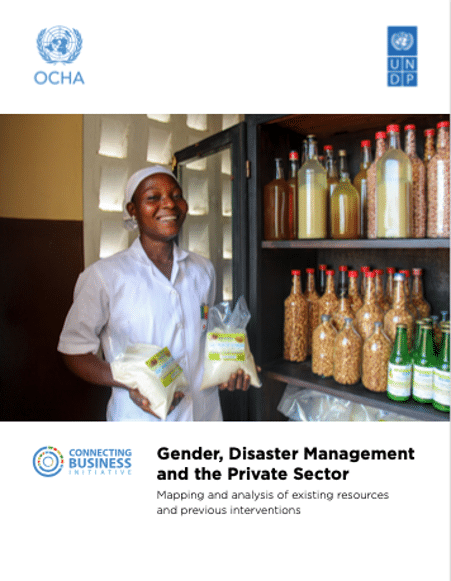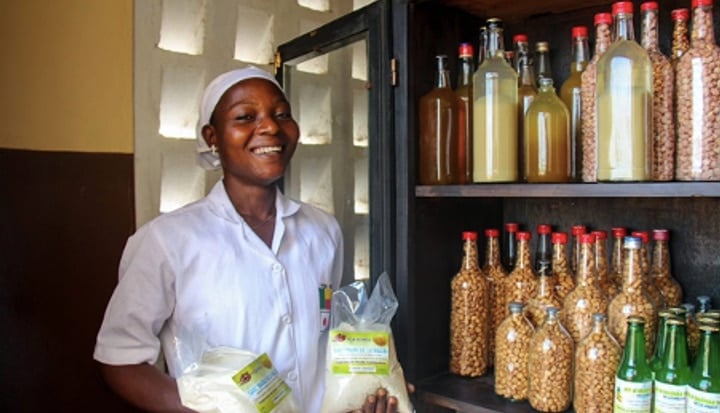One of the key considerations of gender in private sector disaster management is that women are overrepresented in the economic sectors that are hit hardest in disasters, as well as in the informal sector which is specifically vulnerable to disasters. Some might say the selection of career is a personal choice. But is it? The World Bank reports that there are 104 economies with labour laws that restrict the types of jobs women can undertake, and when and where they are permitted to work. This means a majority of countries and does not yet include the cultural barriers nor the socioeconomic characters.
Internationally, women provide over 76 percent of all unpaid care work, more than three times as much as men. Women can spend 14 hours a day cooking, cleaning, fetching wood and water, and caring for children and the elderly. The economic models classify this as leisure time and this workload increases in disasters. What is the implication of it to a small business led by a woman?
And there´s more. In rural areas, the gender pay gap is as high as 40 percent. There are 72 countries where women are not allowed to open bank accounts or obtain credit. Less than 1 percent of landholders in Yemen are women, despite women making up 60 percent of the labour force for crop farming. In Senegal, the literacy rate for females is 39.8 percent, compared to 64.8 for males and in India the rate is 65.8 percent for females and 82.4 percent for males. Close to 90 percent of men and women hold some sort of bias against women, creating invisible barriers.
People living in poverty are most vulnerable to disasters (and women represent 70 percent of the world’s poor), access to resources enables people to combat climate change while information reduces vulnerability.
The question is not whether this has an impact to disaster management. The question is, how could it not? And it is happening in front of our eyes at the very moment. The current pandemic is estimated push 47 million more women and girls below the poverty line. The poverty rate for women was expected to decrease by 2.7 percent between 2019 and 2021, but due to the pandemic and its fallout, projections now point to an increase of 9.1 percent. For many, this seems surprising and for a good reason; Research shows that for every three men quoted in media coverage of the COVID-19 outbreak, only one woman is quoted.
Disasters don’t discriminate, but their impact does, and this is highly dependent on the existing gender equality situation of each context.
How can business be engaging around the issue?
The OCHA-UNDP Connecting Business initiative (CBi) has launched a new publication that presents the importance of gender in private sector engagement in disaster management, as well as the interconnections between these fields. This document is a shared effort based on the knowledge of a large variety of experts and actors and a starting point to a new thematic area for CBi – it invites all of us to participate in the discussions and exchange ideas on how to bring the theme further.
The publication explains that businesses can play a key role in addressing gender in disaster management, for their  own benefit and beyond. They can react to women’s needs in disasters, by providing solutions tailored to them in water, sanitation and hygiene (WASH), health, shelter and protection, or food security. Addressing the digital gender divide and improving women’s access to mobile phones also improves women´s access to many technology-based small business financing, recovery and humanitarian interventions. It also enables women to better work or manage their business from the safety of their homes in contexts of heightened security concerns and in other disaster situations, such as a pandemic.
own benefit and beyond. They can react to women’s needs in disasters, by providing solutions tailored to them in water, sanitation and hygiene (WASH), health, shelter and protection, or food security. Addressing the digital gender divide and improving women’s access to mobile phones also improves women´s access to many technology-based small business financing, recovery and humanitarian interventions. It also enables women to better work or manage their business from the safety of their homes in contexts of heightened security concerns and in other disaster situations, such as a pandemic.
Furthermore, stable markets, healthy and secure employers, consumers who can purchase products and services, good governance and strong institutions are all also vital to the functioning of the private sector, and all benefit from gender equality. When the private sector invests in building resilience of their assets – whether capital, facilities, or employees – it contributes to strengthening local capabilities for resilience and recovery. Including gender in such efforts is a win-win for everyone.
CBi continues to develop its new thematic area of gender – practical tools and webinars are next to come. Stay tuned and participate to the discussion through our webpage, Twitter, LinkedIn and Facebook. You may also have a look at our brief introduction video and earlier webinars on the topic (here and there).










